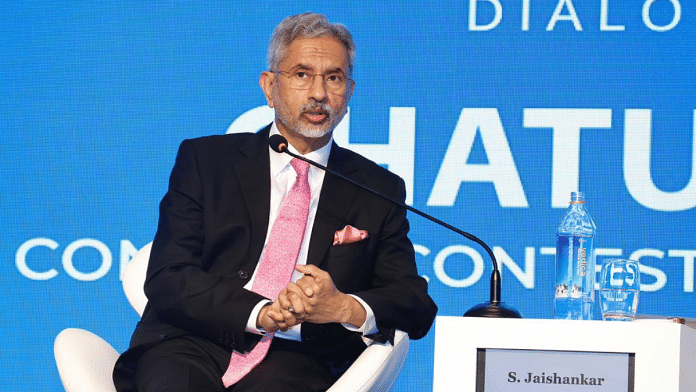New Delhi: In perhaps one of the most informal sessions at the Raisina Dialogue this year in New Delhi, External Affairs Minister S Jaishankar Friday responded to questions from a diverse panel of experts about India-China relations and colonial hangovers in international bodies like the United Nations (UN).
Speaking during a session at the Raisina Dialogue titled ‘The Wonk Tank: Where Expertise Meets Authority’, Jaishankar peppered his responses with jokes, sharp one-liners, and references to cricket, often drawing laughter from the audience.
“All these indices on ratings of democratic norms and free press…are the equivalent of sledging in cricket. It’s meant to psych you. I’m saying that particularly looking at Michael [Fullilove],” he said, turning to the executive director of Australia’s Lowy Institute.
The Modi government has often scoffed at India’s low rankings on the Electoral Democracy Index and Reporters Without Borders (RSF) Press Index over the last few years. Last May, when India ranked below Afghanistan in the RSF Press Index, Jaishankar said this was the result of “mind games”.
Fullilove asked the Indian foreign minister whether there is a middle ground between India and China at a time when the two countries remain in a border standoff since 2020.
He cautioned that China could play “mind games”. “The mind games which will be played would be that this is just between [India and China] — that the other 190 odd countries in the world don’t exist in our relationship. That will be the mind game that will be played and I don’t think we should play it. If there are other factors that can be harnessed by me [India], to get on better terms for an equilibrium, why should I forgo that right?” he asked.
One shouldn’t give another country with whom it is competing a “veto” over one’s own policy choices, Jaishankar added.
These remarks come two days after Indian Defence Secretary Giridhar Aramane called China a “bully” while speaking at an event in Delhi.
Earlier this week, India and China held the 21st round of Corps Commander talks that failed to make progress in further disengagement in Ladakh, indicating a continued stalemate.
Apart from Fullilove, the panel at Friday’s session included three other experts — Bruce Jones, senior fellow at US-based Brookings Institution; Eghosa E. Osaghae, director-general of the Nigerian Institute of International Affairs; and Leslie Vinjamuri, professor of international relations at SOAS University of London, UK.
‘Decolonisation’ of the UN
The need to reform the UN featured prominently in many sessions at the three-day Raisina Dialogue, especially when India has been pushing for a permanent seat on the UN Security Council.
There are five permanent members in the UNSC with veto powers — China, France, Russia, the UK, and the US. The remaining 10 in the council are non-permanent members who enjoy rotational two-year terms.
Osaghae suggested that reforming the UN would essentially be an exercise of “decolonisation”.
The Indian foreign minister agreed but noted some progress has been achieved in the Intergovernmental Negotiations (IGN) framework, which comprises a group of countries working within the UN to reform the global body.
Ambassadors from Kuwait and Austria are current co-chairs of the IGN.
Pleasure to meet the co-chairs of the Intergovernmental Negotiations: Ambassador Tareq Albanai of Kuwait and Ambassador Alexander Marschik of Austria.
Appreciated their assessment of the ongoing discussions on UNSC reform.
The international community hopes that under their… pic.twitter.com/6J0akebxJq
— Dr. S. Jaishankar (@DrSJaishankar) February 20, 2024
“Right now, different models on how to reform the UN are being presented. There’s a Mexico, Liechtenstein, L69 model of which India is a part, and Africa will present theirs,” Jaishankar said.
One of the experts on the panel, however, warned that UNSC reforms may not materialise by the time Global South leadership in other international platforms like the G20 will end up passing the baton onto the West.
“There’s been a wonderful run of Global South leadership of the G20 from Indonesia, India, Brazil to South Africa. But as we look at 2026, the picture looks different — it goes to the US,” Vinjamuri explained. “And by 2026, the UN Security Council probably won’t have been reformed.”
The inclusion of the African Union (AU) in the G20 had notably taken place during India’s G20 Presidency last year.
On the issue of UNSC reform, Fullilove joked that membership be based on International Cricket Council (ICC) test rankings, noting that India and Australia would greatly benefit.
“The better solution would be to leave that to the BCCI (Board of Control for Cricket in India),” Jaishankar replied.
(Edited by Uttara Ramaswamy)




Nice & a useful report. EAM’s stand on China is interesting. Is he hinting about moving ahead of bilateralism ? Is there any other country about which he would say the same thing?